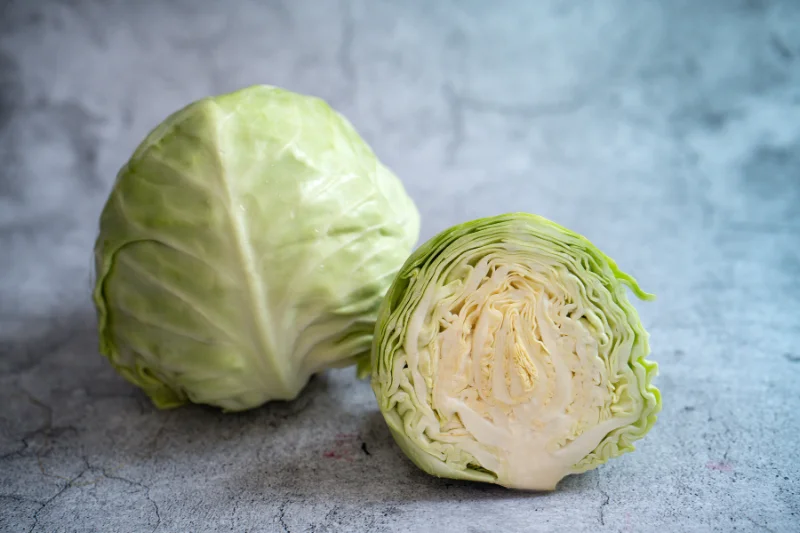Why we should love white cabbage
Fresh, local vegetables are few and far between in Germany in the fall and winter. Nevertheless, many people give white cabbage a wide berth. A mistake, because white cabbage is a real power cabbage.
Most people only know white cabbage as sauerkraut—or perhaps as an ingredient in a kebab. But the vegetable can do more: It also tastes good raw in a salad—for example, with apples, some bacon, and a strong vinaigrette. Or how about in a soup or quiche? Alternatively, you can also roast the mild-sweet leaves in a wok or braise them in the oven as a side dish.
No matter which variant you choose, in the end, not only your taste buds but your entire body will be happy. Ref.
Nutrient content and quantity data for cabbage
According to the USDA, 100 g of raw cabbage contains; Ref.
- 23 calories.
- 92.57 g water
- 1.27 g protein
- 0.06 g total fat (adipose)
- 5,5 g carbohydrates
- 1,9g dietary fiber
- 2,79g sugar
- 48mg calcium
- 196mg potassium
- 33mg Phosphorus
- 37,5 mg Vitamin C
- 80 IU vitamin A
- 108,7μg vitamin K
Here are the top seven health benefits of white cabbage:
1. Cabbage strengthens the immune system
Vegetables provide our body with all kinds of vitamins and minerals, first and foremost vitamin C. About 45 milligrams are per 100 grams. This is enough to cover half of an adult’s daily vitamin C requirement and prevent colds.
Good to know:
The vitamin C content of white cabbage increases when it is gently heated. Why? It contains a lot of ascorbic acid, a precursor of vitamin C that only becomes vitamin C when heated.
2. cabbage keeps the intestinal flora healthy
This is where a special variety of white cabbage comes into play: sauerkraut. It contains plenty of lactic acid bacteria, which are good for our intestines. They are able to kill germs.
But be careful:
Always cook sauerkraut only slightly al dente, and do not overheat. This destroys the bacteria, just like vitamin C. Therefore, never buy sauerkraut pasteurized, but rather fresh from the barrel. Pay attention to the keyword “freshly fermented”.
3. cabbage reduces the risk of cancer
Here, too, we stay with the special case of sauerkraut. It contains isothiocyanates, a substance that, according to studies, can slow down the growth of cancer cells. In addition, the cabbage contains methyl methionine sulfonium bromide, a protein compound that can help reduce ulcers.
Caution:
Just like spinach, do not reheat cabbage dishes. This reverses the effect. White cabbage also contains nitrates, which can turn into carcinogenic nitrosamines when reheated.
4. Cabbage is good for the heart
And, of course, not only because we simply feel good all over after a delicious meal. White cabbage contains a good portion of potassium, which keeps our heart healthy.
5. Cabbage helps us lose weight
This is due to the fiber it contains. Our stomach and intestinal tract have a good time with them and we are full longer. If you want to reduce weight, it should therefore not be missing from the menu. In addition, the fiber helps to lower cholesterol levels.
Kitchen tip: White cabbage does not need to be washed. It is enough to remove the outer leaves, so the inside is well protected. The head is best quartered to cut out the hard stalk wedge-shaped.
6. cabbage strengthens our bones
One serving of cabbage contains about as much calcium as a glass of milk and thus already covers half of our daily requirement. And our body needs calcium for healthy bones and teeth. In addition, white cabbage covers the recommended daily dose of vitamin K. This activates bone-building on top of that, but it also prevents the calcium from depositing dangerous plaque in the blood vessels.
7. Cabbage detoxifies the body
In addition to many vitamins and minerals, white cabbage also contains so-called glucosinolates. These are sulfur-containing molecules that have an antibiotic effect and help the body get rid of toxins.
Good to know:
Unfortunately, white cabbage has a disadvantage. It has a flatulent effect. However, you can avoid nasty winds with spices such as anise, fennel, or caraway, either directly in the dish or as a tea after a meal. Ref.
